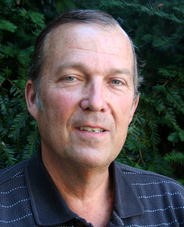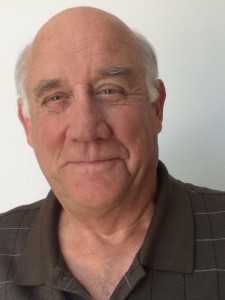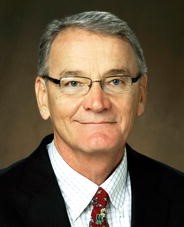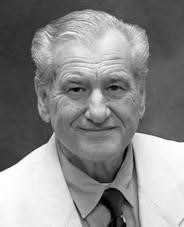2015 Honorary Life Member Selections
Dr. Donald Halseth
It is my pleasure to nominate Dr. Donald Halseth as Honorary Life Member of The Potato Association of America. Don’s service to the potato industry and his contributions and commitment to The PAA make him extremely worthy of that honor.
Don’s connection with potatoes began after graduating from University of California working with Ron Voss. He joined the potato program at Cornell in 1981 where he was responsible for extension and applied research. In addition to addressing the research and extension need of New York growers, Don has been a valuable resource to potato growers, and university and industry personnel throughout North America.
Don has a long history in evaluating clones from potato breeding programs throughout the eastern US and Canada. He has been an active member of the Northeastern Regional Project 1231 for potato variety development and cultural practices. The project generates critical information to potato breeders. He is a major collaborator in USDA, Cornell, University of Maine, and North Carolina State potato breeding programs and has cooperated with other programs throughout the US and Canada. His efforts in evaluating clones from numerous programs have contributed to the release of numerous chip stock and table stock cultivars adapted to the eastern production areas. His participation and leadership in the snack food potato trials has been instrumental in evaluating newly released cultivars and promising lines under differing environmental conditions. His cooperative attitude, basic crop knowledge and organized approach make him a valuable asset to potato research and extension staff throughout the east coast and beyond.
Don has been an active member of The PAA since 1982. He has attended most if not all meetings since then. He was elected Vice President in 2009 and elevated to President in 2010. Don’s leadership and commitment helped make key decisions for the society. He is an active member of the Extension, Production & Management (Chair, Vice Chair, Secretary); and Utilization & Marketing sections. In addition, he has served on the Board of Directors, Honorary Life Membership, Site Selection and Graduate Student Competition Committees. Don co-chaired the 1986 (Ithaca) and 2008 (Buffalo) PAA local arrangements committee, which resulted in very effective and enjoyable meetings.
Don and his wife, Carol, have been strong supporters of the fund raising efforts of The PAA. Carol made a number of beautiful quilts that were auctioned at annual meetings. They have been active in many other activities at the meetings as well.
Nominated by,
Joseph B. Sieczka
Professor Emeritus
Dr. Gary Secor
Gary Secor was born and raised in Bozeman, Montana which was an exceptionally wonderful place to live. He received a BS degree from Montana State University in Zoology and an MS degree in Botany also from Montana State. His first exposure to the potato world was in graduate school when he worked as a technician for Dr. Jim Shepard, which included studies with protoplast and tissue culture and with potato viruses. During this time he was also director of the Potato Virus Testing Lab at Montana State in cooperation with the Montana Potato Improvement Association, the first potato virus lab in the US. He moved to CA in 1975 and graduated with his PhD degree in Plant Pathology from the University of California, Davis in 1977. He immediately accepted a position as potato pathologist at North Dakota State University where he continues to work.
His professional areas of work have been diagnosis and management of potato and, more recently, sugar beet diseases, and variety development of potatoes. He worked with several potato breeders at NDSU, and served as interim director of the potato breeding program at NDSU for 3 years. With potatoes, his work has concentrated on late blight management, seed handling and treatment, Fusarium dry rot, blemish diseases, zebra chip and disease free seed potato production. His pioneering work lead to the identity and understanding of a new disease, zebra chip. In addition to his potato work, Dr. Secor was asked to develop and lead a project on sugar beet diseases in 2000. He conducts research on fungicide resistance management of Cercospora leaf spot, and identified a new species of Fusarium named Fusarium secorum as part of the Fusarium wilt complex. In addition to research, he also teaches graduate and undergraduate classes, has mentored numerous graduate students, and is a frequent speaker at grower meetings in the US and internationally. He is the recipient of the Eugene R. Dahl Excellence in Research from NDSU, the Meritorious Service Award from the Northern Plains Potato Growers Association, the Recognition Award from the Latin American Potato Association, the Distinguished Service Award from the Sugarbeet Industry of Minnesota and North Dakota, and the Distinguished Service Award from the National Potato Council. He was on a developmental leave at the National Potato Center in Remehue, Chile in 2008.
Gary has served PAA on the editorial board, as senior editor, the finance committee, Chair of the Pathology Section, Chair of the Site Selection Committee and Chair of the Local Arrangements Committee for the Annual Meeting in 1998. Dr. Secor loves to travel; one of the most enjoyable parts of his work is international travel and meeting people and exploring potato fields and cultures around the world—and have incredible adventures. Not only is Dr. Secor well known for his research contributions to the potato industry, but also he is a friend to all. He always has the time to talk and you never leave a conversation with Gary without laughing. It is always an enjoyable experience whenever you get to speak with Gary because of his personality and profound knowledge of the potato.
Gary has been working with potatoes and potato science since 1971, and has had to explain to strangers and friends many times why he works in the potato world. Potatoes have been his professional life for 44 outstanding and enjoyable years, and he has thoroughly enjoyed all the students, meetings, colleagues, growers and adventures it has provided him. He is still married to Sharon, and they have four lovely and strident daughters and so far, eight grandchildren, four of each. It is a great honor for Gary Secor to become an Honorary Life Member of The Potato Association of America.
Nominated by Dr. Andy Robinson
Dr. Neil Gudmestad
Dr. Neil C. Gudmestad, University Distinguished Professor of Plant Pathology and the Neil C. Gudmestad Endowed Chair of Potato Pathology at North Dakota State University, is a world recognized authority on the biology and management of potato diseases caused by several pathogen groups. He has made significant contributions on diseases caused by ten fungi, four viruses and three bacteria in more than 30 years as a faculty member.
Dr. Gudmestad was born in North Dakota and was raised on a farm. He obtained a B.S. in biology and chemistry from Valley City State University (1974) and the M.S. (1978) and Ph.D. (1982), in plant pathology from North Dakota State University (NDSU). He joined the Department of Plant Pathology at NDSU as an Assistant Professor in 1985 and rose through the academic ranks. In a testament to Dr. Gudmestad’s productivity, he was named an inaugural University Distinguished Professor (UDP) by NDSU in 2007 and to date, only ten faculty have been named a UDP at NDSU. In January 2015, Dr. Gudmestad was named the Neil C. Gudmestad Endowed Chair of Potato Pathology. The endowed chair position was created from an endowment established by contributions from potato growers, processors, agricultural chemical manufacturers and other allied industries from 13 states. This is the first fully endowed faculty position at NDSU and it is the first time a sitting faculty member has had a position named in their honor.
During his 30 year research career at NDSU, Dr. Gudmestad has focused on pathogen biology and diversity and on the management of potato diseases. His work has advanced the science of plant pathology and has greatly benefitted the agricultural sector he serves. Since all commercially-acceptable potato cultivars are susceptible to numerous diseases, the potato industry must have safe, effective and sustainable tools for disease management to maximize profitability and to provide a safe and high quality product for consumers. Dr. Gudmestad has dedicated his career to developing these tools through his research program and, despite possessing no extension appointment, has spent countless hours teaching potato producers and processors how to manage diseases making up to 25 invited grower presentations annually in multiple states. This clearly demonstrates the importance and relevance of his research to the potato industry.
Dr. Gudmestad is an author of 120 refereed journal articles and 16 peer-reviewed book chapters. He has published in excess of 200 other edited technical publications and proceedings including web-based media. He is a frequent invitee to speak at national and international meetings and symposia. He has been active in the training of graduate students. He has been the major professor or co-major professor of 20 M.S. and Ph.D. students who have completed their degrees; many have gone on to successful careers in academia, industry and government. One of his Ph.D. students currently serves as a USDA National Program Leader for plant pathology.
Local commodity groups and national and international potato organizations have acknowledged Dr. Gudmestad’s scientific contributions. Especially noteworthy was the inaugural Researcher of The Year by the National Potato Council in 2000. More recently, Dr. Gudmestad was presented with the Lifetime Achievement Award at the 2015 World Potato Congress held in Beijing, China. Dr. Gudmestad has worked on diseases that affect all stages of the potato plant from seed tuber to storage and more recently his research has focused on invasive pathogens. His efforts aim to solve real-world problems facing the potato industry. The impacts of Dr. Gudmestad’s research are immediate and practical making his expertise valuable and sought-after by the global potato industry.
Nominated by Dr. Andy Robinson
Dr. Alexander D. Pavlista
Born in Praha, Czechoslovakia, Dr. Alexander (Sasha) Pavlista left in 1948 when his parents escaped as the Communist regime took power. After a 3-year journey through Austria, W. Germany and France, they arrived on the ship ‘Liberte’ into New York harbor and he first saw the “grandest Lady” that ever was or will be, the Statue of Liberty in 1951. Growing up in New York City, Dr. Pavlista attended parochial schools. After reading, at age 13, a biography of Louis Pasteur and the novel ‘Arrowsmith’ by Sinclair Lewis, he wished to do research in biology and received his B.S. in Biology from Manhattan College. After working 2 years at Oak Ridge National Lab doing research in bio-medical science, Dr. Pavlista returned to NYC and received a Ph.D. from City Univ. of New York in Biology with a specialty in Plant Physiology. His research concerned enzyme activity during lettuce seed germination. While at CUNY, he also taught at H.H. Lehman College. Upon graduating, Dr. Pavlista was a USDA Research Associate in weed science at North Carolina State Univ. studying witchweed, a parasitic plant. He will tell you that is when this NYC boy from the street was first exposed to a working farm. After 2 years, he went to work for American Cyanamid Co. in Princeton, NJ for 9 years on plant growth regulators. There, he began studying potatoes (1980) and attended his first PAA meeting in Monterey, CA (1982). From his work on potato, he received a patent for nitroguanidine and cyanoguanidine chemistry.
With a strong interest in the potato industry, in 1988, he became the Potato Specialist in the Univ. of Nebraska where he resides today. He will tell you that he is a “lab rat” that became a “field mouse” in this position. His potato research at UNL has centered on plant growth regulators and hormones, environmental response, vine desiccation, and pest control. He released the cultivar ‘Red Cloud’ and has published five book chapters on potato. He has published 42 journal articles on potato and 25 on other crops such as corn, wheat, dry bean, and Brassicas. His Extension achievements include the website ‘Potato Education Guide,’ 20 volumes of ‘Nebraska Potato Eyes,’ 22 Extension publications (NebGuides and Circulars), over 20 years of cultivar evaluations (many published in the USDA’s “National Potato Germplasm Evaluation and Enhancement Reports”), and pest control reports and alerts for potato growers.
Dr. Pavlista is thinking of retiring from UNL after reaching the landmark of 50 years of continuous research. He and his lovely wife, Victoria, will live in Denver, CO. Victoria Pavlista was instrumental in his success in the potato industry and co-hosted the 2004 PAA meeting in Scottsbluff, NE. In many ways, she has supported him in his goals and endeavors.
Nominated by Dr. Larry Hiller



